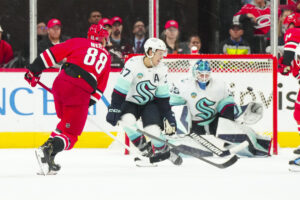You may have heard: Jesperi Kotkaniemi signed an offer sheet from the Carolina Hurricanes. It’s a lovely, snarky little thing, and lots of fun to talk about. But it’s also designed to stop any more from happening in the future. So have fun with this one, because it might be the last we see in quite a while. We’ll get into some of the specifics, and use them to show how offer sheets can and can’t work. But we also want to discuss something much more important.
That NHL general managers absolutely suck at offer sheets.
Whether it’s the problems inherent in an Old Boys network, basic timidity, or self-sabotage, whatever the intent of the offer sheets was, it ain’t doing it. So consider this a basic primer in the care and feeding of your newly-adopted offer sheet.
The Offer Sheet Is Good for You
But only if you use it. The usual presentation is that preparing an offer sheet is somehow “poaching” or “stealing” players from other teams. This isn’t the case, of course. It’s a bit closer to handing a construction knife to someone who’s suspended in an onion bag. The player that’s handed the knife still has to use it. Note that this doesn’t mean it’s the player’s “fault” for signing a deal! How many of us dream of a day when a company walks up and hands us a deal for the same work at triple the salary?
Let’s Get Specific
We’ve already talked a bit about how this is a revenge deal for a Montreal Canadiens offer sheet extended to Sebastian Aho two years back. There’s the exact phrasing of the press release, there’s the $20 signing bonus, there’s switching their Twitter feed to French. The bonus, of course, isn’t just Aho’s number but is approximately one-millionth the bonus Aho was offered by Montreal. It’s Scorned-Mate Pettiness all the way down which, again, is fun to watch in a Real Housewives sort of way. But as far as practicality goes, there’s much to be desired here. Let’s dig in.
What Dundon Got Right
There are positive things Hurricanes owner Tom Dundon did with this offer sheet. Now, we know he’s the owner and not the general manager, but obviously, Don Waddell is doing this either at Dundon’s prompting or with his permission, so. Offer sheets are usually quite a big deal, and we’ll get to that in a bit. Credit or blame is going to Dundon, and there’s a bit of both here.
Kotkaniemi is angry with his current team. That’s good. Not for him or the Canadiens, obviously, but as far as offer sheet targets go, that’s good. He had a very difficult regular season and was a healthy scratch for the playoffs. He ended up doing reasonably well when all was said and done, with five goals and eight points in 19 games. Mostly used as a “third-line+” centre, he got power-play time but couldn’t produce there. The team has been taking a hard line on contract negotiations – fairly or otherwise – and he was pretty well primed to move.
The other good move is making the offer for a high price, but a single year. Even if Montreal matches, they will have to decide whether or not to give Kotkaniemi a qualifying offer next season. At just 21 years old, he’s far from peaked, but he might not improve enough to justify $6.1 million next year, either. So they will have another decision to make with free agency as the alternative. Heck, they can’t even trade him this year if they DO match.
What Dundon Got Wrong
For all the issues Kotkaniemi has had with the Habs, he’s still a third-overall pick that GM Marc Bergevin stuck his neck out for. In a weak year for centres, he stood out. But we were one of the most optimistic of his future abilities, ranking him over most other draft boards at the time. Selecting him third overall was a surprise, and Bergevin took heat for it. What Dundon got wrong is that the current GM is the same one who drafted the player he’s targeting. There’s personal involvement.
As mentioned, the amount is big. However optimistic of Kotkaniemi’s future you are, it’s really hard to justify that price tag. He had a good first season – 11 goals and 34 points as an 18-year old is good – but his second year was a bit of a disaster. Injuries, a concussion, and eventually assignment to the AHL limited him to 36 games before the season’s postponement. This season’s numbers you’ve already seen. The same amount of consternation Montreal will feel in keeping him is what the Hurricanes will feel if they get him.
They are, after all, giving up a first- and a third-round pick in what is considered quite a good draft year. And paying $6.1 million to a player who didn’t make the top-six on a team desperate for centres, who, by the way, will be a free agent next year if they don’t give him a qualifying offer. Now, maybe they have already reached a deal or understanding of some kind. But if not, Dundon’s coach Rod Brind’Amour has a decision to make this year. And his GM Don Waddell has a decision to make next year.
The Lessons
Target Annoyed Players
All the pressures that Montreal GM Bergevin is feeling come from his fan base. Yes, his team is in a cap squeeze, but there are always ways to fit in players you want. It’s harder for some than others, but there are ways. Cap space isn’t really all that important – otherwise, Tampa Bay would have lost a lot more than their third line in the off-season. Don’t get us wrong, that’s an excellent third line! But given the dire straits the team was in, cap-wise, there were big targets available. But those big targets didn’t want to leave.
Make the Numbers Make a Difference
And offers were undoubtedly made – or at least suggested. But it doesn’t really matter if you offer a star player 10% more than they’re getting already if they’re happy. Most people don’t want to move house because it’s a pain in the butt. This is more true when families are involved. The more people who have a say in what that player does, the less they are going to want to change. Unless it’s for a BUNCH of money. Dundon’s offer was for a BUNCH of money, likely tripling what Kotkaniemi was offered from Montreal. Both these points tie into our next point.
Don’t Pitch Stars
Look, we know you want your team to make an offer to Elias Pettersson. We know that. Everyone knows that. But Pettersson is far more valuable to not only the Vancouver Canucks but to perpetually embattled GM Jim Benning more than you’ll want to pay. An $11 million, seven-year deal would be a laughable relief. A $15 million, one-year deal would be met with a shrug as the cost of doing business. He’s worth more than four first-round picks because he’s in the league now and a known element. The fan base is… antsy for some success after the very modest results of the past seven years. Benning wouldn’t have the chance to use a single one of those first-round picks. Speaking of which…
Make the Compensation Tempting
Another thing the Kotkaniemi deal got right. A first and a third next season – from a good team – is edging towards a reasonable trade. Not quite enough, but you can see the neighbourhood. Every word is that the 2022 draft is a good one, so lining up some shots isn’t a bad idea, especially if your team is going to be hard-pressed to even make the playoffs. But a first, a second, and a third? Bear in mind that the draft is happening in Montreal’s Bell Centre, and those picks have a little more appeal. If the youngster has a slow season, that could look very good for the manager who walked away with the picks.
Again, going for superstars is pointless. There is no compensation worth waiting for the six or seven years it takes for the draft picks to come to fruition. No general manager is going to let that happen. But for an unproven prospect? Or an established middle-six forward? That makes the decision to match a tough one.
In Conclusion
Aho and Kotkaniemi have been the only offer sheets signed in the past eight years. The only one to get accepted this century was Dustin Penner in 2007. That’s not quite as impressive as it sounds, because only ten offer sheets have been made in that time. Do they actually help? That’s a bit of a toss-up, but they can be used more effectively. The only offer sheet with zero repercussions was Ottawa’s excellent signing of Ron Tugnutt in 1996 because they offered him so little money.
For everyone else, take the advice. Treat them like a tool, and offer sheets can work for you. Don’t, and we end up with one offer made every two years. And then only out of spite.
Main Photo:






